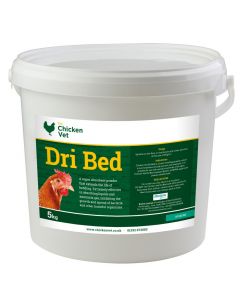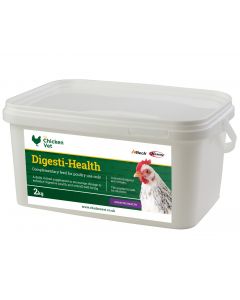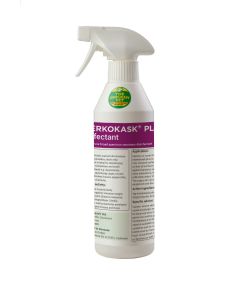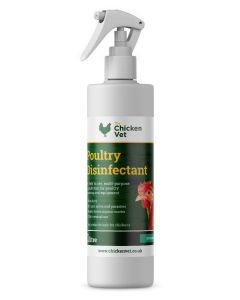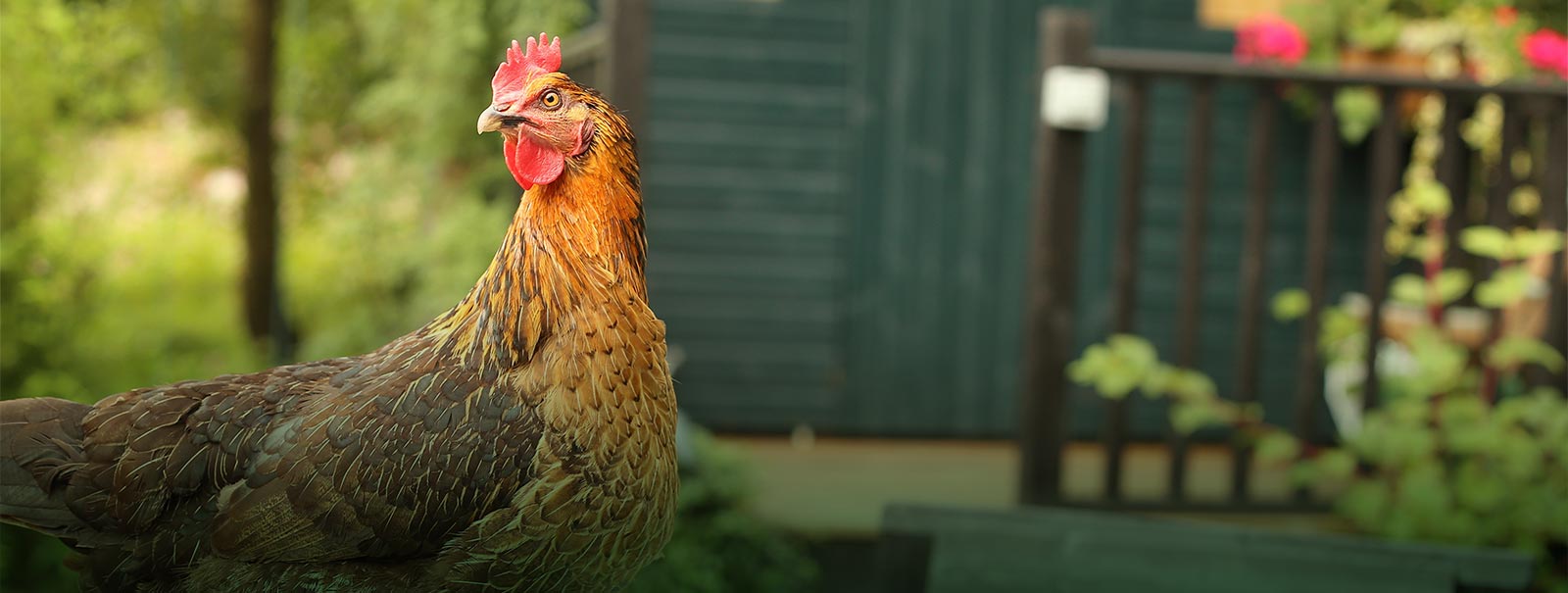
The advice hub Beginners Guide
Cleaning
Regular cleaning and disinfection of your chicken shed is important to keep down the levels of harmful parasites, bacteria and viruses which can cause disease in both your birds and your family. Ideally, your shed should be cleaned and disinfected on a monthly basis. The protocol for cleaning and disinfection is outlined below:
- Remove all of the bedding, compost it or burn it, especially if you have a red mite infestation.
- Wash out the coop using some warm soapy water or detergent to lift off any stuck on muck. Many disinfectants are inactivated by dirt and grime so it is important to use a detergent to remove it, allowing your disinfectant to work properly.
- Remove the perches and nest boxes and wash all areas where red mites may hide.
- Let the shed dry before applying a disinfectant. Applying, to a wet surface only dilutes the disinfectant so it does not have the required strength to kill pathogens and parasites.
- Dilute an appropriate disinfectant to the correct concentration. We recommend Chicken Vet Disinfectant to destroy most bacteria, viruses and fungi, if you need to destroy coccidiosis you must ensure you choose a product licensed to destroy the coccidial oocysts such Interkokask.
- Apply the disinfectant at the correct dilution if applicable.
- Leave the disinfectant to dry.
- Sprinkle around some Chicken Vet Dri Bed which absorbs moisture and also contains disinfectant which releases over time.
- Re-bed the shed using fresh bedding, dust extracted shavings are best even in the nests.
- Don’t forget to clean and disinfect the drinkers and feeders also, use Chicken Vet Disinfectant for this.
Feeding
For most people the idea of feeding chickens conjures up images of people sprinkling handfuls of fresh grain on the range with the odd meal worm added for good measure.
However, whilst your birds may enjoy this it is not necessarily the best thing for their health.
The average laying chicken requires between 120g and 150g of food per day with slightly more during cold weather and slightly less during the summer.
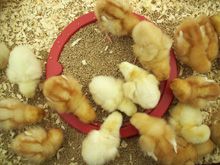
Commercial mash or pellets designed for chickens are perfectly balanced and will provide all the necessary nutrients your chickens need without any additional foodstuffs being given.
Always make sure that the feed is in date, as once past its sell by date, the vitamins and minerals will have broken down and be of no use to your bird, which give the risk of vitamin or mineral deficiencies.
It is worth buying an appropriate sized sack of feed for your flock to ensure the sack does not last more than a few weeks.
Check the feed has not become stale, mouldy or damp as mouldy feed can harbour fungi which produce harmful toxins that can damage the digestive and nervous systems of your birds. Adding Digesti-Health to your birds feed daily can help absorb any fungal toxins; it contains Biomos which absorbs toxins.
We all like to treat our pets but as you would with your cat and dog, you need to be treat-wise with your chickens to prevent obesity. A handful of mixed corn in the afternoon or the odd mealy worm are suitable treats. Kitchen scraps should not be fed to chickens and they can be harmful to birds causing sour crop and diarrhoea. Bread can be high in sugar and salt plus it can ferment in the crop, so don’t feed it or if you do only very small amounts.
Always feed your birds from a feeder and not on the ground or out in the run aside of corn as a scratch feed. Feeding birds outside attracts wild birds and rodents, potential carriers of disease.
Try not to change your bird’s diet or the brand of feed suddenly as this can lead to a digestive upset in your bird and be the cause of diarrhoea.
Feeding old or inappropriate feed to your birds can lead to the deficiencies listed below:
Vitamin A deficiency will lead to:
- Your chicken being more vulnerable to skin, respiratory tract and kidney infection
- Poor hatchability
- Poor growth
- Poor eyesight
- Nervous system problems
Vitamin D deficiency will lead to:
- Brittle, deformed bones
- Brittle egg shells
- Poor hatchability
Vitamin E deficiency will lead to:
- Nervous system problems in chicks (crazy chick disease)
- Muscle weakness
Vitamin K deficiency will lead to:
- Blood clotting problems and minor cuts can allow birds to bleed to death
Vitamin B1 (Thiamine) deficiency will:
- Cause poor growth
- Nervous signs
Vitamin B2 (Riboflavin) deficiency will:
- Lead to curly toe paralysis in chicks
- Cause clubbed down feather
Vitamin B6 (Pyridoxine) deficiency will lead to:
- Poor growth
Niacin deficiency:
- Will cause poor feathering and poor growth
Pantothenic Acid deficiency will cause:
- Poor hatchability
- Poor growth
- Poor feather quality
- Rough skin
Biotin deficiency will cause:
- Poor growth
- Skin problems
Folic Acid deficiency will cause:
- Poor growth
- Poor appetite
- Deformed legs and slipped tendons
- Diarrhoea
Choline deficiency will cause:
- Poor growth
- Poor hatchability
- Can contribute to fatty deposits in the birds liver
- Lameness
Vitamin B12 deficiency will cause:
- Poor hatchability
Calcium and Phosphorous are needed to form healthy bones and egg shells. Any deficiency or imbalance between the two can lead to brittle bones and egg shells.
Zinc deficiency can lead to poor growth, poor hatchability and skin problems.
Manganese deficiency can lead to poor growth and limb deformities.
Selenium deficiency can lead to nervous system problems and muscle weakness.
Water
Like all animals, chickens require a daily supply of fresh drinking water. However, as pet owners we are not used to giving water to animals producing food for humans (eggs). All animals including chickens will drink roughly 50ml of water per kilogram of body weight every day. This would mean that the average chicken weighing 2kg should drink 100ml of water per day. Please remember that birds in lay require an additional 100ml/day to produce an egg meaning most laying hens need roughly 200ml/day.
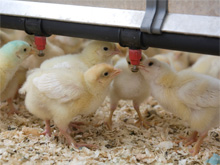
In warm weather this need will increase and in cold weather the requirement will fall.
Always ensure that your birds are given fresh water daily and that ideally weekly their drinkers are washed with a suitable disinfectant such as Chicken Vet Disinfectant or Interkokask once a week.
There are several drinkers available, most people use either water towers or having a tray like drinker. The towers are better as the chickens cannot walk in them and contaminate the water.
Ideally the drinkers should be the height of the back of your smallest bird because chickens love to scratch bedding in to their water.
The area around the drinker can become damp so the litter in this area may need to be replaced frequently. Never leave this wet litter as it can provide an ideal breeding ground for bacteria as well as potentially causing ulcers to form on the feet of your birds.
You can use Chicken Vet Dri Bed in such areas as this powder absorbs dampness and also contains a disinfectant to deal with bacteria.

